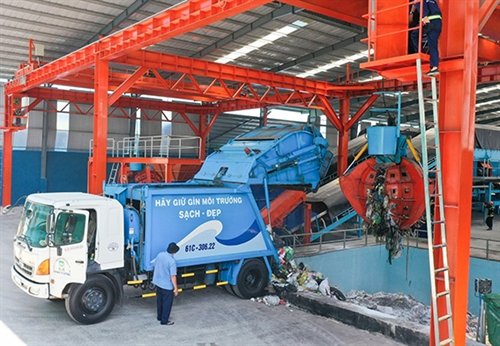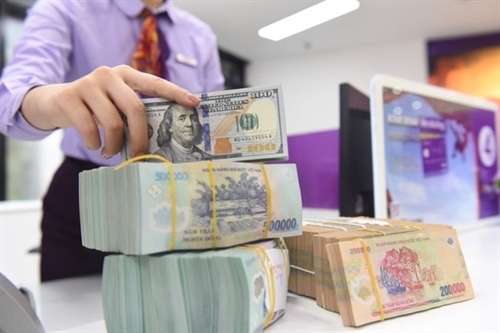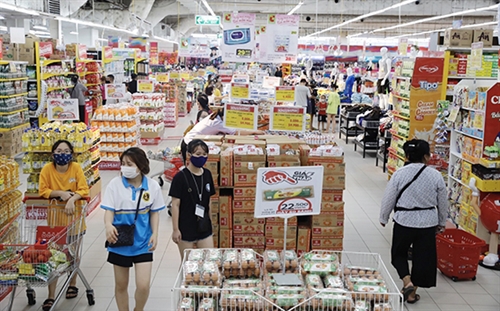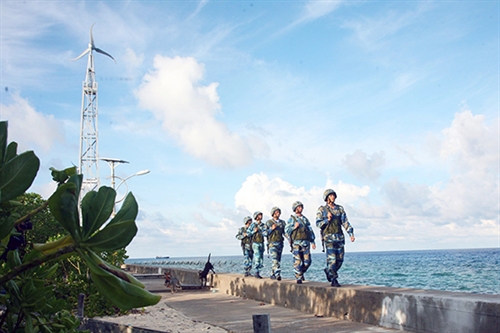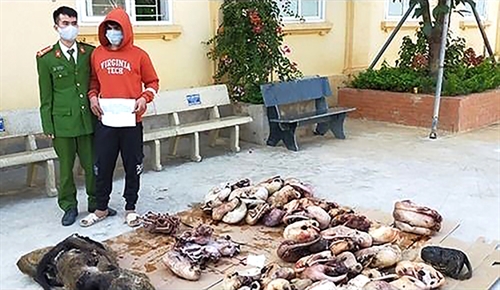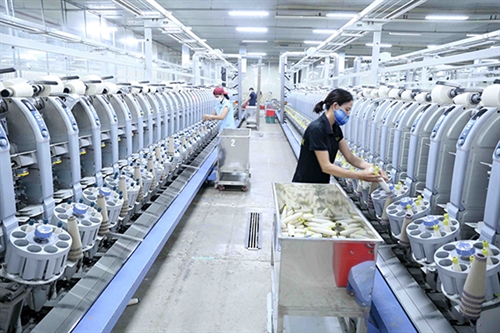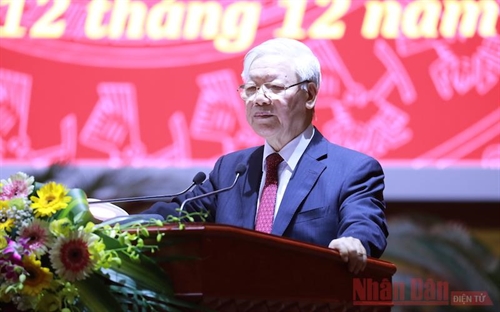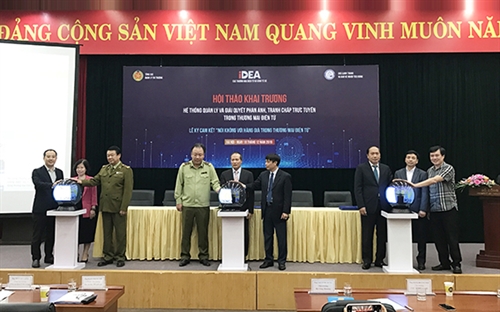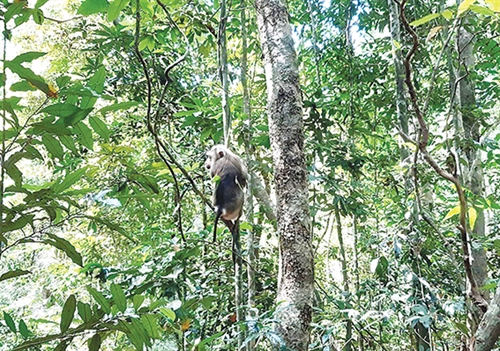International cooperation has been recognized as a key in the fight against corruption in general and corruption relating to wildlife crime in particular. In order to create a legal basis for international anti-corruption efforts, the United Nations adopted the Convention against Corruption on October 31, 2003. Vietnam became an official State Party to the Convention on August 19, 2009. This article analyzes the Convention’s provisions and Vietnam’s regulations on international cooperation in the fight against corruption, especially those concerning the wildlife, and puts forward some recommendations for making them more compatible with the United Nations Convention against Corruption.
Do Thu Huyen, Ph.D.
Government Inspectorate of Vietnam
International cooperation within the framework of the United Nations Convention against Corruption
The United Nations Convention against Corruption (the Convention or UNCAC), the first and only legally binding universal anti-corruption convention, devotes a whole chapter, Chapter IV, to regulating “international cooperation”, stipulating that “Where appropriate and consistent with their domestic legal system, States Parties shall consider assisting each other in investigations of and proceedings in civil and administrative matters relating to corruption” (Article 43.1). Mutual legal assistance, extradition and recovery of proceeds from corruption are common forms of international cooperation where States Parties need to support one another in the process of investigation, prosecution, adjudication and judgment enforcement of transnational corruption cases.
Mutual legal assistance in the fight against corruption
The UNCAC stipulates: “States Parties shall afford one another the widest measure of mutual legal assistance in investigations, prosecutions and judicial proceedings in relation to the offenses covered by this Convention” (Article 46.1). Mutual legal assistance is considered a formal form of cooperation in which judicial agencies of different countries support one another in the settlement of criminal cases involving foreign elements with or without treaties serving as a legal basis for cooperation activities. The scope of mutual legal assistance specified in Article 46.3 of the Convention is relatively comprehensive, covering taking evidence or statements from persons; effecting service of judicial documents; executing searches and seizures, and freezing; examining objects and sites; providing information, evidentiary items and expert evaluations; providing originals or certified copies of relevant documents and records; identifying or tracing proceeds of crime, property, instrumentalities or other things for evidentiary purposes; facilitating the voluntary appearance of persons in the requesting State Party; any other type of assistance that is not contrary to the domestic law of the requested State Party; and identifying, freezing and tracing proceeds of crime. The UNCAC also lists the cases in which States Parties may not refuse a request for mutual legal assistance on the sole ground that the offense is also considered to involve fiscal matters (Article 46.22).
Extradition of corruption offenders
Extradition is a traditional form of international cooperation in which a country transfers a person back to the country where he/she committed a violation of the law for criminal prosecution or execution of a legally effective judgment against that person. According to Article 44 of the UNCAC, extradition is applicable to corruption crimes under the Convention, even in cases in which such acts are not punished under domestic law. Notably, if a State Party that makes extradition conditional on the existence of a treaty receives a request for extradition from another State Party with which it has no extradition treaty, it may consider the Convention the legal basis for extradition in respect of any offense to which the Convention applies (Article 44.5). The main contents of provisions on extradition include principles of extradition, basis for denial of extradition, and competence, procedures, and order of extradition. Usually, in the case of the countries that have not signed a bilateral mutual legal assistance treaty on extradition, it is possible to follow a multilateral treaty on criminal extradition that the two countries have joined. In the spirit of maximum cooperation, the UNCAC requires States Parties to endeavor to expedite extradition proceedings and to simplify evidence requirements for any crime for which this provision is applied in compliance with their laws (Article 44.10). In particular, when a State Party does not extradite a person on the ground that such person is one of its nationals, it will have to, at the request of the requesting State Party, submit the case without undue delay to its competent authorities for the purpose of prosecution (Article 44.11).
Recovery of proceeds from corruption
Recovery of proceeds from corruption is a process in which authorities of State Parties discover, track down, freeze, seize, and confiscate assets acquired through commission of corrupt acts in accordance with the procedures and statutory proceedings with the aim of expropriating funds or returning assets to lawful owners or managers. Article 51 of the UNCAC regulates: “The return of assets pursuant to this chapter [Chapter 5 - Asset Recovery] is a fundamental principle of this Convention, and States Parties shall afford one another the widest measure of cooperation and assistance in this regard”. International cooperation in the recovery of proceeds from corruption is formal or informal cooperation between two or more jurisdictions to support each other in the process of investigating and taking temporary urgent measures to prevent assets from being dispersed and then proceed with procedures to confiscate and recover them to the requesting State Party.
Article 53 of the UNCAC provides direct asset recovery measures in which each State Party allows another State Party to initiate civil actions in its courts to establish title to or ownership of property acquired from commission of crime; take such measures as may be necessary to permit its courts to order offenders to pay compensation or damages to another State Party that has been harmed by their offenses; and permit its courts or competent authorities, when having to decide on confiscation, to recognize another State Party’s claim as a legitimate owner of property acquired through the commission of an offense established in accordance with the Convention.
To overcome obstacles in the recovery of proceeds from corruption, Article 54 of the UNCAC provides a mechanism for asset recovery through international cooperation in confiscation which requires State Parties to prescribe the necessary procedures to secure the recovery of assets abroad as well as to take measures to facilitate the recovery procedures. Because conviction-based forfeiture is very ineffective in practice, the UNCAC also recommends that countries consider applying asset recovery even in the absence of a criminal conviction (Article 54.1). The Convention grants State Parties the right to dispose of proceeds from corruption, including by return to its prior legitimate owners (Article 57), but favors the return of such assets to the requesting State Party, in accordance with the basic principles of Article 51. If having any doubt that the recovered assets, after being returned, may probably be infringed upon again, some State Parties can request international organizations or civil society organizations to take part in the return of assets and monitor the recovered assets.
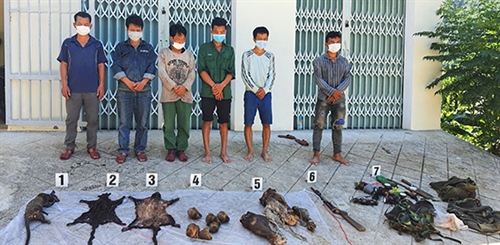 |
| Illegal wildlife hunters are caught red handed in Bach Ma national park__Photo: Tuong Vi/VNA |
UNCAC as a legal ground for international efforts against wildlife crime
Corruption and wildlife crime are all complicated offenses, requiring collective action as well as participation of many transnational actors. Improving institutions and laws, strengthening law enforcement and capacity, enhancing multidisciplinary coordination mechanisms on issues concerning wildlife crime, and increasing awareness to reduce the demand for wildlife are among measures to prevent and combat wildlife-related offenses that have brought positive initial results. However, experience in the fight against wildlife-related offenses in Asian countries shows that[1] this fight will not be successful without the active participation of “additional players”, both state and non-state, that “are able to fill in the regulatory gaps that states are unable to fulfill” for the common good of the world.
While the international legal framework on prevention and combat of wildlife trafficking does not have specific regulations on international cooperation mechanisms, the effect of mutual legal assistance treaties on the prevention and combat of wildlife illegal trafficking remains limited and in the context that most of the State Parties to the Convention on International Trade in Endangered Species of Wild Fauna and Flora (CITES) are also State Parties of the UNCAC, the UNCAC can be considered a legal basis to request mutual legal assistance, extradition of wildlife offenders and recovery of proceeds from corruption cases and matters involving wildlife.
International cooperation in the fight against wildlife crime basically includes similar contents to international cooperation in anti-corruption, covering such activities as providing and exchanging information and specimens between countries, searching and arresting people and workshops, collecting evidence and testimonies, temporarily transferring convicts to support the investigation, determining location of wildlife products, investigating cash flows, and recovering proceeds from wildlife crime. The UNCAC provides comprehensive legal tools and technical assistance for the above-said matters.
At the national level, as the UNCAC follows a comprehensive approach to prevention of corruption and enforcement of anti-corruption law, the incorporation of the UNCAC’s provisions into domestic laws will help eliminate agents that support or facilitate wildlife-related offenses. For example, Chapter II of the UNCAC, especially Articles 5 and 13 on promoting social participation and enhancing integrity and accountability, may be incorporated into national laws and applied in prevention and combat of illegal wildlife trafficking to assess, identify and prevent possible risks. This is especially important in the context of the growing and evolving wildlife crime with more sophisticated methods in both scale and nature.
Compatibility of Vietnam’s regulations on international cooperation in anti-corruption with international standards
Mutual legal assistance and extradition of offenders
For the time being, issues related to mutual legal assistance in criminal matters and extradition of criminal offenders are both regulated under the 2007 Law on Mutual Legal Assistance (the Law). However, there remain incompatibilities between the Law and international standards and practices.
Scope of mutual legal assistance
The scope of mutual legal assistance in criminal matters, which includes six contents as provided in Article 17 of the Law, is quite narrow compared to international commitments of Vietnam. The practice of mutual legal assistance shows that in many cases it is necessary to allow proceeding-conducting persons of the requesting State Parties to participate in some activities in the process of providing mutual legal assistance in the requested State Parties, allow persons from the requested State Parties to enter the requesting State Parties to support the investigation or provide evidence, etc., whereas Vietnam’s current law does not regulate this issue. Vietnam’s legal system also lacks provisions on mutual legal assistance in freezing, distraint, seizure, confiscation and handling of proceeds from crime while these activities are actually provided in treaties in the field of criminal justice that Vietnam has concluded or acceded to and have occurred in realities.
Order, procedures and competence for mutual legal assistance
The Law fails to provide or just provides in a general manner the order, procedures and competence to perform some common types of mutual legal assistance requests such as summoning witnesses or expert witnesses; escorting prisoners abroad serving the investigation or adjudication of criminal matters or cases; freezing and seizing assets, etc., thus leading to confusion and difficulties in implementation. Particularly, there is no clear distinction in the order and procedures for handling outgoing and incoming mutual assistance requests. Additionally, the Law does not specify the procedures for “closing” mutual legal assistance requests, making it difficult for authorities to proceed with subsequent steps in case of receiving no response from foreign parties for mutual legal assistance requests. The Law also lacks specific regulations on the order of extradition from Vietnam and extradition from abroad to Vietnam.
Grounds for refusing requests for mutual legal assistance, extradition
At present, the Law has no provisions on criteria for distinguishing cases in which refusal of mutual assistance is mandatory and cases where it is possible. Although the principle of reciprocity is recognized in Articles 4 and 66 of the Law, its implementation has not yet been guided, leading to confusion and inconsistent application in reality.
According to Vietnam’s statement when ratifying the UNCAC, the country does not directly apply the UNCAC for extradition, but will base on bilateral extradition treaties between Vietnam and States Parties. However, most of the extradition bilateral treaties that Vietnam has concluded affirm the principle of criminalization as a basis for extradition. Meanwhile, the main problem in the extradition of offenders in criminal cases involving foreign elements lays in the interpretation and application of principles and provisions in treaties on extradition. In fact, more and more State Parties have eliminated the death penalty and considered the non-application of the death penalty or the application but non-execution of the death penalty as a condition for criminal extradition.
Expenses for mutual legal assistance
According to Article 31 of the Law, expenses for mutual legal assistance in criminal matters between Vietnam and a State Party will be paid by the requesting State Party, unless a prior agreement has been made. However, such provision is unconformable with treaties and international practices which all require the requested parties to bear expenses for fulfilment of mutual assistance requests, except particular expenses.
Recovery of proceeds from corruption
According statistics from the Government Inspectorate of Vietnam, just less than 10 percent of proceeds from corruption have been recovered. This humble rate is mainly due to the lack of a comprehensive and effective legal framework for this issue. Apart from a few provisions directly related to the recovery of proceeds from corruption of the Penal Code and the Anti-Corruption Law, asset recovery is regulated in a general and indirect manner in different documents and recognized in principle such as “proceeds from corruption must be returned to their owners or lawful managers or put into state funds” and “the confiscation and recovery of proceeds from commission of corruption are carried out under decisions of competent state agencies in accordance with law.”
Similarly, asset recovery involving foreign elements is briefly defined in Article 70 of the Anti-Corruption Law as follows: “On the basis of treaties to which the Socialist Republic of Vietnam is a contracting party and in accordance with the basic principles of Vietnam’s law, the Vietnamese Government will cooperate with foreign governments in recovering proceeds from corruption of Vietnam and of foreign countries and in returning them to their lawful owners”. Meanwhile, the Law on Mutual Legal Assistance does not have specific provisions on recovery of corrupt assets besides indirect provisions such as those on the principle of mutual legal assistance, delivery of assets, documents and money.
Incorporation of the UNCAC’s provisions into domestic laws and its impacts on the fight against wildlife crime
In wildlife crime, corruption acts as a factor that supports, promotes and facilitates the commission of acts of illegal wildlife trafficking. Corruption can occur before, during and after illegal wildlife trade and is most often manifested in bribery or embezzlement[2]. To contribute to enhancing the effectiveness of wildlife crime prevention, it is necessary to prevent relevant corrupt acts. The 2015 Penal Code and the 2018 Anti-Corruption Law basically meet the UNCAC’s international standards for these acts.
Bribery
Article 2.1.h of the 2018 Anti-Corruption Law defines bribery as the act of “giving or brokering bribes to handle affairs of agencies, organizations, units or localities for self-interest”. Under Article 364.6 of the 2015 Penal Code, those who “give or will give bribes to state employees of foreign countries or employees of public international organizations...” will also be punished for commission of bribery. However, the act of demanding bribes does not constitute the offense of accepting bribes but is only regarded as an aggravating factor that defines the penalty. Noteworthily, the concept of bribery is no longer limited to material interests, but covers also “unwarranted non-material benefits” (according to the definition of “self-interest” in Article 3.7). In particular, the 2018 Anti-Corruption Law regulates bribery in the private sector, thereby enhancing the compatibility of the law with the UNCAC, compared to its previous version, the 2005 Anti-Corruption Law.
Embezzlement
The offense of embezzlement is specified in Article 2.1 of the 2018 Anti-Corruption Law and Article 353 of the 2015 Penal Code. The 2018 Anti-Corruption Law now regulates corrupt acts in both public sector and private sector. Meanwhile, the 2015 Penal Code has increased the quantitative threshold value of money and property embezzled and appropriated to ensure the match between penalties and the nature and severity of the offense.
Money laundering
The 2015 Penal Code provides in its Article 324 the offense of money laundering, covering acts of converting and transferring proceeds from commission of crimes, including the crime of corruption. However, as Vietnam’s law does not regard illicit enrichment as an offense, this act is not considered a source crime of money laundering. This is an institutional shortcoming concerning anti-corruption and money laundering legislation that needs to be addressed soon.
Solutions to improve effectiveness of international cooperation in anti-corruption in Vietnam
Vietnam should continue to focus on raising the quality of international cooperation in anti-corruption through efforts to improve laws and policies and law enforcement capacity, adhering to the spirit of ensuring compatibility with the domestic legal system and full compliance with Vietnam’s international commitments, specifically as follows:
Mutual legal assistance and extradition
Firstly, it is necessary to develop a separate law on mutual legal assistance in criminal matters and extradition, ensuring full compliance with requirements of treaties and bilateral treaties of which Vietnam is a State Party in the spirit of maximum cooperation and assistance and consistency with domestic laws, especially the 2015 Penal Code. Secondly, the scope of mutual legal assistance in criminal cases and matters should be expanded to meet practical requirements, permitting refusal of mutual legal assistance requests only if such requests require application of coercive measures and providing the non-application of the death penalty in mutual legal assistance activities when foreign parties so request. Thirdly, it is a need to clarify and distinguish the process and procedures for handling incoming and outgoing mutual legal assistance requests and to add the procedural order and procedures for creating a legal basis for the implementation of reciprocity commitments, while the time limit for the settlement of cases requiring mutual assistance from foreign parties should be specified. Fourthly, responsibilities of, and mechanisms on coordination among, competent agencies, especially between procedural agencies in border provinces and authorities of neighboring countries, in mutual legal assistance in criminal cases and extradition should be devised. Fifthly, current regulations should be revised to require requested parties to bear expenses for performance of mutual legal assistance and extradition, unless otherwise agreed between involved parties. Lastly, guidance on mutual legal assistance process and procedures should be posted in common languages (at least English) on the portal of the central agency acting as the focal point for mutual legal assistance, enclosed with specific contact addresses accessible 24/7.
Asset recovery
The current law should be revised along the line of regulating corruption as a type of crime that has a form, the proof of the consequences of corruption is only an aggravation of criminal liability, criminalizing illicit enrichment in conformity with the UNCAC, specifying the order, procedures and competence for recovery of proceeds from corruption, and empowering proceeding-conducting agencies and proceeding-conducting persons to actively take preventive measures to ensure asset recovery. At the same time, the provision of conviction-based forfeiture should be maintained, prioritizing the application of a value-based asset confiscation mechanism to match Vietnam’s resources and capacity of corruption investigation and detection. Non-conviction-based forfeiture will be used as an additional measure of recovery when asset recovery by criminal methods does not work. However, in order to protect fundamental human rights, the provision and application of non-conviction-based forfeiture should be prudent and subject to strict oversight of authorities and only applied when asset recovery by criminal methods does not yield results or expenses for investigation and conviction and tracing and recovery of assets are estimated to be greater than the value of to-be-recovered assets.
In addition, it is necessary to review all treaties on mutual legal assistance and extradition Vietnam has concluded to so as to make revisions to ensure consistency with the Law on Mutual Legal Assistance in Criminal Matters (to be issued), Extradition Law (to be issued), the 2018 Anti-Corruption Law, the 2015 Penal Code, and other international agreements. At the same time, the country should actively negotiate and sign bilateral cooperation treaties on anti-corruption and treaties on mutual legal assistance in criminal matters and extradition; continue to expand multilateral cooperation to grasp the latest trends of criminals in the region and around the world and learn from experiences in dealing with crime through sharing practices with other State Parties, giving priority to the signing of treaties with countries that are not members of multilateral international conventions, neighboring countries and countries with which cooperation is needed. In addition, Vietnam should actively and proactively fulfill its obligations as a State Party to the conventions it has acceded to, thus meeting the requirements of judicial reform and international integration.-
